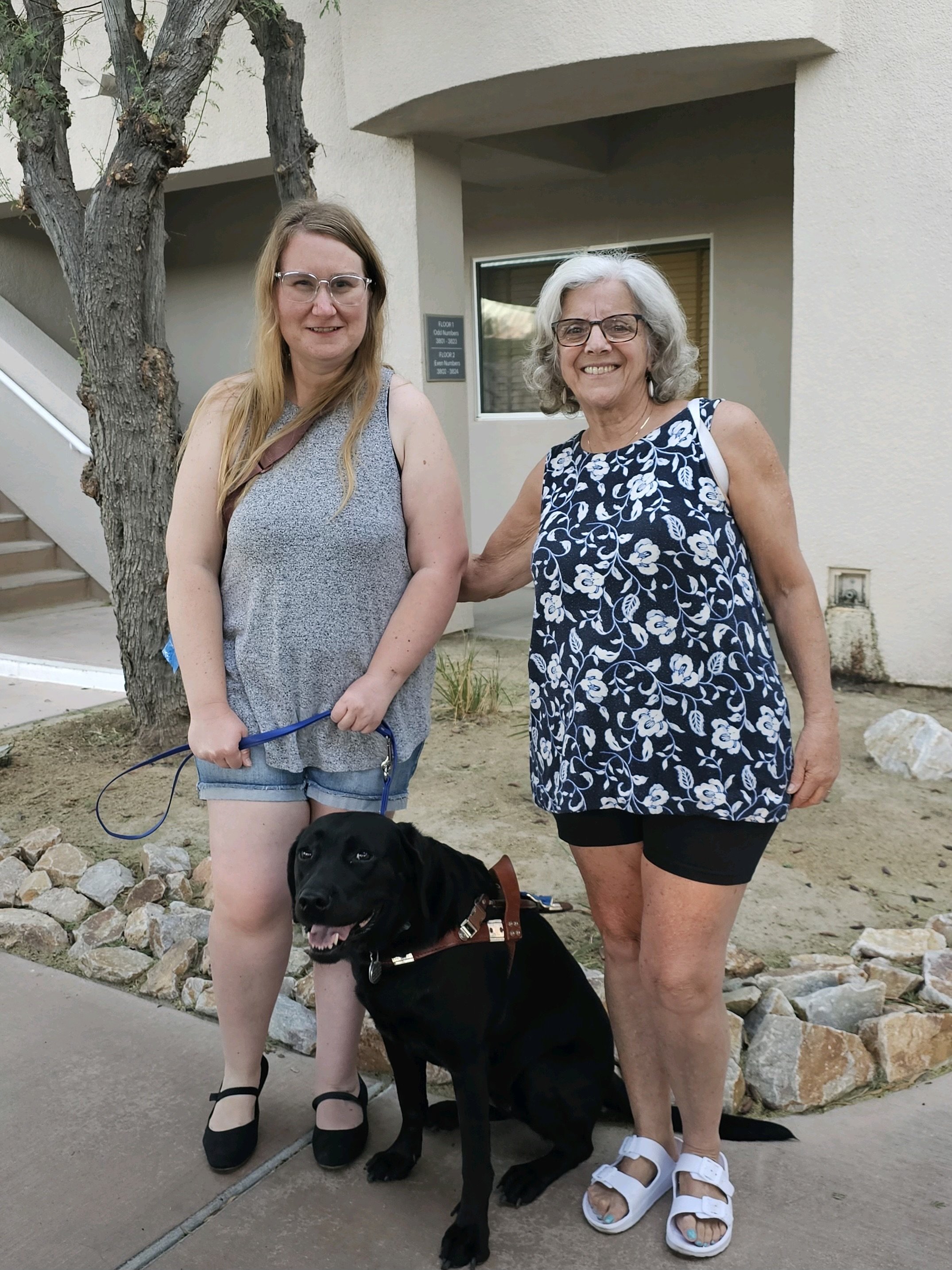What I wish Puppy Raisers Knew:
As I have been working Eve, I have also made connections with many puppy raisers. In making these connections one question I ask them is what they wish they knew before going on this journey of puppy raising. Here are a few things they have shared with me. As a handler, I think all of these points are valid as we have most of the same experiences as the sighted population, just with a few more trips on public transit.
Lindsay and patty standing together with Eve sitting between them in Palm Springs California.
Do your research before choosing to raise for a particular organization: Like I said in my post about What I looked for in a Guide Dog School, as potential puppy raisers it is a good idea to do your research on the individual programs you are looking at raising for, as each program offers different things. In doing this research it might be worth making a list of things you are looking for in a program such as support, the ability to get updates about your puppy as they are in formal training, the ability to meet and possibly attend graduation for the puppy that you spent many hours raising, and possibly building a relationship with their future handler.
Take your puppies into as many environments as possible: Like sighted people, those who are blind or have low vision enjoy going into many of the same spaces as their sighted counterparts, so it's important to expose your puppy to as many public spaces that you frequent, as they will most likely go into the same spaces as a working dog.
Give them access to public and private transportation sources: On a similar topic of taking your puppies into the same public spaces as you would normally frequent, also taking them on public transit or in other transportation options is important, as blind and low vision people will most likely use these sources. This is all because most blind or low vision people cannot drive and often do not have personal drivers meaning that they depend on public transit, Uber/Lyft, paratransit, and sometimes private transportation to get where they need to go. Paratransit is a specialized curb to curb service for persons with disabilities that was put in place after the Americans with Disabilities Act (ADA) was signed.
Don’t be afraid to touch them when they are going to the bathroom: When they are going to the bathroom do not be afraid to touch them as that is how their blind or low vision handler will know they are going to the bathroom and if they will have to pick up after them. On the topic of touching them this is the same approach their blind or low vision handler will check for bumps, lumps, or cuts.
Ask for help when needed: When in public feel free to ask those around you to approach puppies to help in the training process, as it will help educate the public, while also getting the puppy used to being approached by others.
Know that you have a village behind you and your pup: When working with a large organization, know that you have many people you can call upon when you need help. If you are facing challenges feel free to reach out to your regional puppy raiser or other experienced puppy raisers. On this same note, it may be good to do puppy swaps as it will help expose the puppy to different environments. It's important to expose the puppies to different environments, as throughout the dog's working life their handler may go through big life changes such as moves, job changes, and other life events.
Put yourself in a blind person’s shoes: When working with your puppies it is a good idea to put yourself in a blind person's shoes. This might mean putting booties on while blindfolded, grooming while blindfolded, feeding, etc.
It may be hard to give them up but you're giving another person a new leash on life: For some, giving up a puppy after raising them sounds like the worst thing in the world, but know that you are giving another person a new leash on life. These puppies have a bigger destiny than you can imagine. There will come a point to let them fly and do the job they are meant to. If you are lucky, you might be able to follow the journey of them as a working dog.
Blind and low vision people use many of the same mainstream devices that you do, but it may be with some minor modification: Those that are blind use computers, smart phones, home appliances, TV’s, etc., but they may use a screen reader or magnifier to access such devices. It all depends on how much vision they may have left.
Special thank you to my puppy raiser Patty and many others for helping with the writing of this post.
Patty hugging Eve after not seeing one another for 14 months.

